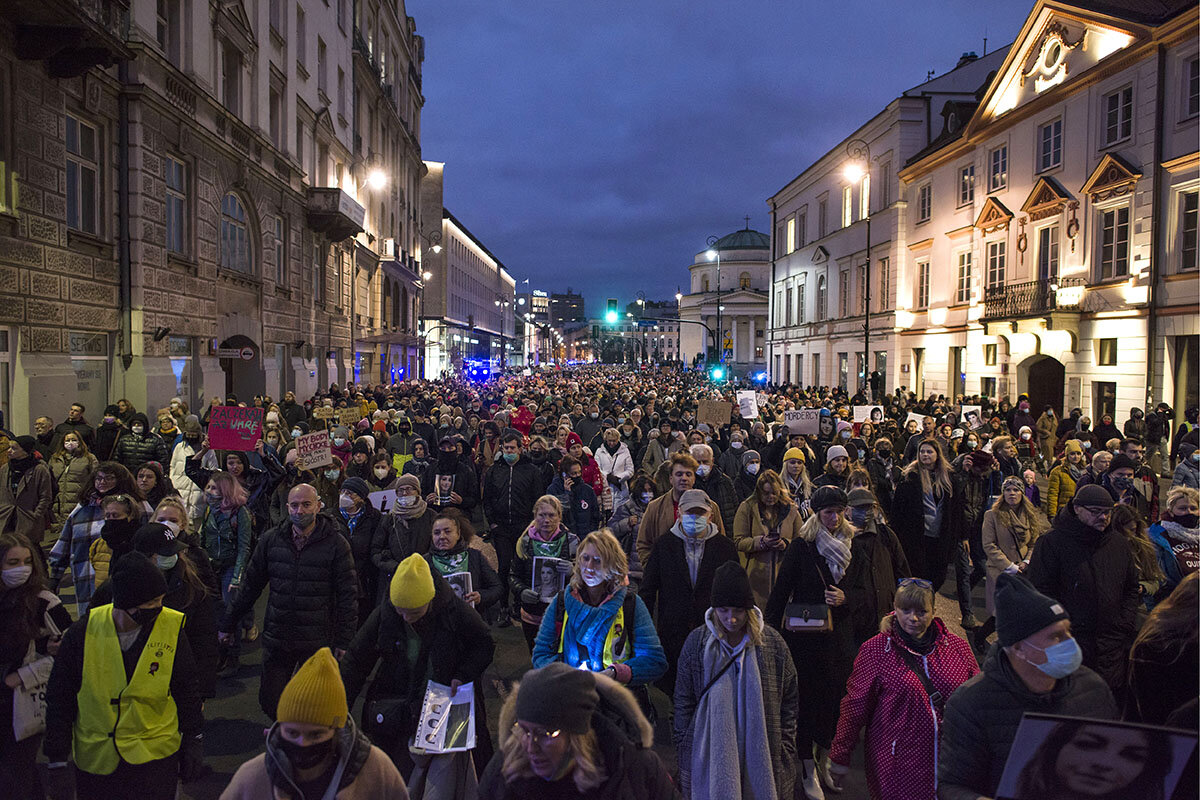Democracy’s challenge: Keeping judges independent and credible
Loading...
| London
Four simple words are critical to any functioning democracy: the rule of law.
But now, this lofty principle is facing a formidable real-world test: weathering the fractious partisanship of our 21st-century politics.
The U.S. Supreme Court’s sudden removal of women’s half-century-old constitutional right to abortion is just the latest sign. A similar controversy has been brewing across the Atlantic, in Poland. In other populist-ruled democracies – including Europe’s oldest, Britain, and Latin America’s largest, Brazil – the courts are also under growing political pressure.
Why We Wrote This
Without the rule of law, democracy is a dead letter. Protecting courts from political pressure is a key path to protecting judicial independence and credibility.
At stake are the twin pillars of the judiciary’s role as guarantor of the rule of law.
The first is its independence – the judiciary’s ability to remain above the fray of partisan politics.
The second pillar – and this may matter even more in today’s political environment – is popular trust in the credibility and perceived legitimacy of the highest courts’ decisions.
The controversy over abortion rights has brought both into question.
Firstly, because the Supreme Court that last week annulled the 1973 Roe v. Wade decision contained three judges whom former President Donald Trump had installed with the overt political aim of overturning the earlier decision.
Secondly, because the court’s abortion ruling ran counter to the views of a clear majority of Americans.
And it came at a time when popular trust in the court has been plummeting. A poll this month – following a leaked early version of the abortion ruling – found a record low of 25% of Americans had confidence in the highest court in their land.
Poland’s constitutional court – reconfigured as part of a purge of judges by the ruling, right-wing Law and Justice Party – has also mandated a near-total ban on abortion. And there, too, polls suggest most people favor a liberalization of abortion laws.
Still, as judges, lawyers, and concerned politicians look for ways to reinvigorate the judiciary’s independence and credibility, they may take some heart from the fact that judicial partisanship has been a perennial democratic challenge.
The “rule of law” is a matter not of pure philosophy. It’s applied by individual judges no more capable of perfect objectivity than politicians. Judges themselves are appointed by others with political views of their own.
And given the judiciary’s key institutional role – as a check on government power – a degree of tension is simply wired into the system.
Still, the question now is whether, amid the anger and extremism setting the political weather in many democracies, efforts to keep the rule of law intact will prove as successful as they once did.
In America, there’s a parallel from the mid-1930s, the early New Deal years of then-President Franklin D. Roosevelt. He was frustrated by a conservative Supreme Court that had struck down key parts of his ambitious economic recovery programs as an overreach of federal authority.
His response was a plan to “pack” the court with New Deal-friendly justices to tilt its balance. Yet he was ultimately blocked by members of his own party, concerned about undermining the checks and balances put in place by the framers of the Constitution.
And then-Chief Justice Charles Evan Hughes also seemed to sense a wider rule-of-law peril in the standoff with Mr. Roosevelt, especially after the president had been reelected in a landslide. Chief Justice Hughes shifted the court away from its opposition to New Deal laws.
Interestingly, current Chief Justice John Roberts seems to harbor similar concerns on abortion. Though backing last week’s ruling, he made it clear he would have preferred it to have been more measured, stopping short of striking down Roe v. Wade outright.
At least for now, the court’s direction is being set by the new Trump-appointed judges.
In the United States and other democracies where the judiciary is increasingly politicized, there is now a growing focus on the potential longer-term consequences of eroding the top courts’ independence and credibility.
In Poland, judges and lawyers have been making that case at home and abroad. The European Union’s top court has ruled against the government’s moves to ensure politically friendly judges, and the EU has withheld some funding to Warsaw, yet so far without major effect.
In Britain, where the government of Boris Johnson has publicly criticized judges after a series of court rulings against its actions, a cross-party parliamentary committee this month publicly expressed its concern about those criticisms’ potentially chilling effect on judicial independence.
Leading Brazilian judges and lawyers, alarmed over President Jair Bolsonaro’s attacks on the judiciary, have petitioned the United Nations for support, concerned that he is laying the ground to reject the result of this fall’s presidential election if he loses.
Ultimately, however, any effective move to re-insulate the judiciary from political storms is going to require leaders across partisan divides to decide that’s in their shared national interest to do so – and that the alternative risks fundamentally damage their democracies.
They’ll have to look beyond the day-to-day political battleground, as President Roosevelt and Chief Justice Hughes did nearly a century ago.
And they will have to meet on a patch of political territory that has been shrinking fast – the middle ground.







